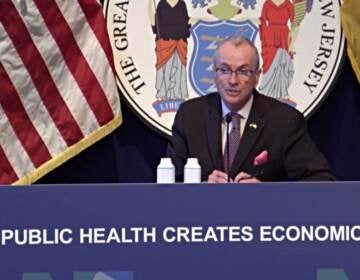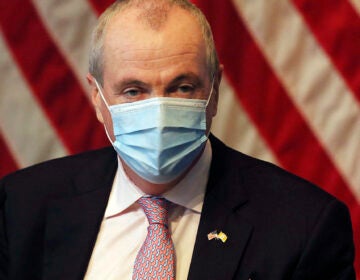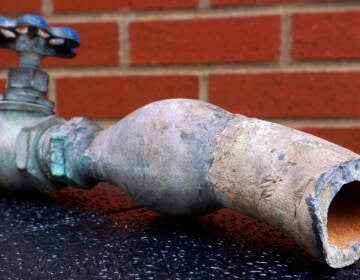Murphy’s target: Replace all lead service lines in N.J. by 2029
The plan includes a call for a $500 million bond issue and a requirement for every child to be tested for lead before starting school.
This article originally appeared on NJ Spotlight.
–
On Thursday, Gov. Phil Murphy unveiled a sweeping agenda designed to eliminate New Jersey’s lead contamination problem in 10 years. The plan includes replacing every lead service line that’s leaching the potent toxin into drinking water and requiring every child to be tested for lead before starting school.
“It is time for us to ensure that New Jerseyans are safe from lead exposure and that generations to come remain safe,” said Murphy. “The damage that is done to kids who have exposure — and it’s not treated, it’s not known — is so overwhelmingly obvious.”
Getting the lead out will be a massive task.
Information from New Jersey water utilities estimates 350,000 lead service lines need to be replaced statewide, and that the cost to replace them all could top $2 billion.
Murphy would remediate the lead problem by asking voters to approve a $500 million bond issue in November 2020 to help public water utilities with paying for lead service line replacement. His goal: to replace all lead service lines within a decade.
He would permit private water utilities to raise rates to help cover costs, estimated at about $6,000 per home. The plan would require home sellers to disclose all lead in the house, whether in pipes or paint and create a “Lead Free” certificate for renters.
Schools would have to test every three years and clearly post the results, and children would need a lead blood test to start school.
High blood lead levels in children
A 2017 survey showed 5% to 7% of kids ages 6 to 26 months had blood lead levels over the federal limit in cities like Irvington, East Orange, and Newark.
“The problem is, there’s not an enforcement arm, it’s there to look at that and make sure it’s occurring. We usually see only about half of the kids are actually getting those tests when they need to be getting them — at the earlier ages when they’re going to be having the most detrimental effects,” said Ben Haygood, director of environmental health policy at Isles, a community-based environmental organization in Trenton.
The governor’s plan closely follows a task force report issued by Jersey Water Works, which notes 80% of child lead contamination comes from lead paint.
The plan makes home inspections more robust and would train more lead evaluation inspectors and abatement contractors.
There could be opposition to some aspects of the plan; a legal fight is already brewing over one water company’s initiative to surcharge ratepayers for the cost of the lead service line replacement.
“We won’t be able to know exactly what the increases are until each utility does the math,” said Chris Sturm of NJ Future, an advocacy group pushing for water infrastructure improvement. “But then you look at total number of lead service lines across New Jersey and the cost of replacing them, it’s really not that big of a number. We understand the concern, but the cost is children’s health.”
New Jersey’s Division of Rate Counsel director Stefanie Brand calls the direct utility surcharge illegal, adding that “allowing utilities to charge ratepayers for work done on private property is a slippery slope that could vastly increase rates and cause hardship for the very people we are trying to help. Where would the obligation end?”
Murphy acknowledged ratepayers would feel some pain.
“We will support the Legislature putting forward the ability of those investor-owned utilities with, we hope, a modest impact on the ratepayer to put replacement into their rate base,” said the governor.
The governor said he has reached out to legislative leaders to get them on board while the details of the plan are still being hammered out.
WHYY is your source for fact-based, in-depth journalism and information. As a nonprofit organization, we rely on financial support from readers like you. Please give today.




